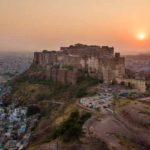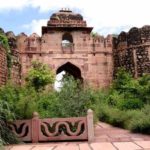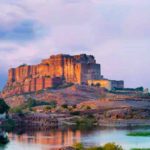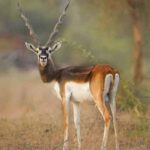Jodhpur Tourism is the second-largest city in Rajasthan, situated just northwest of the Luni River on a tract of land covered with high sandy hills. The region is also sometimes referred to as ‘Marwar’, meaning the region of death because of the area’s harsh desert conditions.
Jodhpur is also popularly called the ‘Blue City’ due to the presence of a sea of square blue-painted houses that cover more than 10 kilometers of the historic walled old city.
A blue pigment coating on a house used to indicate that it belonged to the Brahmins, which are one of the highest levels of the Indian caste system. Over time, the color became a symbol of Jodhpur’s identity for people of all castes.
Jodhpur Tour Packages also has other nicknames including the Gateway to the Thar as the north and northwest areas of the city form part of the Thar Desert and the Sun City due to the overwhelming amount of bright and sunny days it experiences.

History And Culture Of Jodhpur
Jodhpur is the second largest city in Rajasthan and is also situated in the Thar Desert. Barring Jaisalmer, Jodhpur is the closest city to the majestic sand dunes of Thar. The city was once the capital of the Mewar and does justice to the title of being the cultural capital of Rajasthan.
This city was built by Rao Jodha, a Rajput ruler who founded the Marwar Kingdom. Jodhpur Tourism has almost always enjoyed internal autonomy even during the Mughal and the British empires.
The city exudes a certain sense of royalty and flamboyance in its personality, yet it’s too contrasting to stick to one lane. Jodhpur is a big city which is divided primarily into the old and the new town. The settlement around the fort, is the only part that is blue and it’s a blue that is fading as most houses were painted a really long time ago. The newer part of the city is where all the infrastructure and the hospitals and the colleges are at.
What’s interesting about Jodhpur is that it’s touristy, but not at the same time, it’s really not! You’re extremely likely to spend most of your time in the old part of the city around the fort, since that’s where all the action is. Walking around the mazy lanes, looking into these blue beautifully rustic houses and catching a glimpse of the Mehrangarh Fort towering over you and the inhabitants of Jodhpur may not seem as royal or luxurious. But all the same, it’s beautifully refreshing in its own way.
A lot of sightseeing in Jodhpur is based on the idea of walking around the old town, witnessing the everyday life of the local while catching a glimpse of the impressive Mehrangarh Fort. You’re at some point either going to be doing this or the reverse – looking over the blue city from the various viewpoints from the Fort, and therein lies the beauty. No matter where you’re viewing the city or the Fort from, the sights remain just as beautiful.
But that is not all that Jodhpur Tourism has to offer; it’s home to some truly beautiful temples, a cenotaph and a palace that houses one of the best hotels in the world.
As the cultural capital of Rajasthan, Jodhpur has always been significant, right from the time when the city was the powerseat of the Marwar regime. One of the easiest ways to distinguish Jodhpur from its peers is its fashion. You can see it in the various colorful turbans (Safa) that the men wear. The turban is also a great way to cover and protect the head from the unforgiving sun in the Thar Desert. The colorful chunris and the various types of jewelry worn on the head, neck, arms and wrist are for most parts specific to the Jodhpuri culture.
Polo has also been associated with Jodhpur since the advent of the British empire and Jodhpur Tourism, apart from contributing to a top class Polo team has helped also reinvent the fashion side of the sport by inventing the Jodhpurs (The English riding pants, which are still widely worn).

Food In Jodhpur
Jodhpur does not disappoint when it comes to food. You’re likely to find the more widely popular Rajasthani dishes like the Laal Maas (slow cooked lamb in chillies), The Dal Baati and the Makhaniya Lassi ( A lassi that is toppled with a lot of butter and dry fruits). The onion kachori is a dish that is revered in Jodhpur and is a must try.
Try the Gulab Jamun Ki Sabzi and the Papad Ki Sabzi, which may sound wrong at first but is delicious! If you’re in Jodhpur Tourism in the winters, order the Haldi Ki Sabzi, which would not only satiate you, but also keep you healthy!
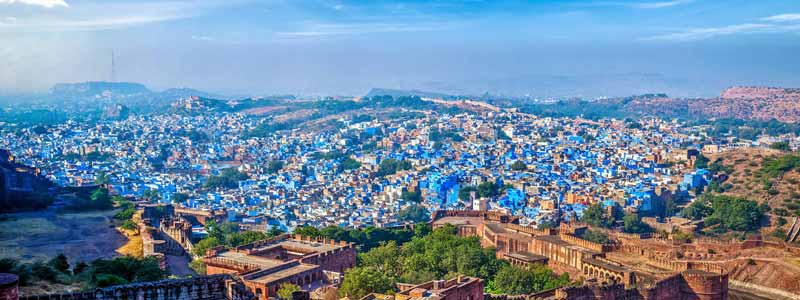
Places to visit in Jodhpur
Jodhpur has the charm of pre-historic times and is embedded with art, architecture, and infrastructure. For a blissful experience, there are many places to explore in Jodhpur Tourism. With a number of historic attractions and cultural heritage sites, here are some of the best places to visit in Jodhpur during the tour –
Mehrangarh Fort:
This is the first places to visit in jodhpur When we reached the entry gate our guide was waiting there we bought the entry ticket and entered the fort. We entered into the fort and stopped one point then our guide explained about the history of fort then he started where we are standing right now it is called the Mehrangarh fort and The Mehrangarh Fort- a symbol of the pride of Jodhpur Tourism t and the fort is 70 feet wide and 117 feet high and it was built in 1459 by Raja Rao Jodha.
Presently a fort run by the private trust, the fort has been divided into multiple sections. For entry there are 7 gates and Jai Pol and Fateh Pol Darwaja are the most important among them.
As per history Jai Pol was built by Maharaja Mansingh to defeat the army of Jaipur and Bikaner. Also Fateh Pol was built by Ajit Singh to defeat the Mughals in war.
Inside the fort has many palaces which include Moti Mahal, Rang Mahal, Chandan Mahal and Phool Mahal. The round roof of Phool Mahal is finely carved with gold.here there is a chair where the Maharaja Sitted called Srinagar Chaki.
Later our guide took us to the fort where we can enjoy a beautiful view of the Blue city of Jodhpur Tourism. He said that Jodhpur’s other name is “Surya Nagri ” (abode of Sun).
At the highest point of the fort there are two big cannons, also from here you can see the beautiful view of the sun set and the whole of Jodhpur in blue color.
There is also a small museum in the fort where royal palanquins, miniature paintings, furniture,old instruments and historical armory are kept which symbolize Rajputana culture.
Jaswant Thada :
if you see the Taj Mahal in Agra and it is almost familiar with this Taj Mahal, This building was built by Maharaja Sardar Singh of Jodhpur in 1899 in memory of his father Maharaja Jaswant Singh Second. It looks like a temple from outside, inside you will find more late royal family members photos in Hall. It is famous as Taj Mahal of Jodhpur Tourism.
Umaid Bhawan Palace:
This is one of best places to visit in jodhpur The Umaid Bhawan palace is located on court road and it was constructed by Maharaja Ummid Singh. Being on Chitra pahari the palace is also called Chitra Palace.
This palace is made of sandstone and is considered a perfect example of Indian colonized and deco Architecture. Presently This palace is divided into several parts, a part of the Palace converted into the museum and other part converted into a luxury heritage hotel
It is managed by Taj Hotels. The palace has approximately 350 rooms and is also the principal residence of the royal family of Jodhpur Tourism. It is spread 27 acres of area, this palace including 16 acres of wide garden and has a sitting room, a private meeting hall, a court hall to meet the public, a vaulted banquet hall, private dining room, a ballroom, a library, an indoor swimming pool
Granite floors and the inner dome of the palace are the major attractions of this palace. So whenever you go to Jodhpur, be sure to enjoy this luxurious palace.
Best Time To Travel To Jodhpur
The best time to visit Jodhpur, just like the rest of Rajasthan, is in the winter. This is anytime between October and March as the weather is extremely pleasant. If you can time your trip to be in Jodhpur Tourism for a festival like Diwali or Holi, you’re sure to witness a lot of fervor and celebrations.
We recommend avoiding Jodhpur Safari from March to July as the weather can be quite unbearable, primarily owing to the extreme heat and a lack of monsoon. Rajasthan gets a little bit of rain from late July/early August onwards and the weather gets really pleasant so August is an option but if it doesn’t rain for a few days, you’ll quite literally feel the heat.
How to get to Jodhpur: Fuel your travels
By Road – With an intricate network of national and state highways, one can access easily access Jodhpur Tourism. Cities such as Delhi, Ahmedabad, Jaipur and Udaipur, are especially well connected. You can hire a taxi or private vehicle and enjoy the scenic drive through quaint towns and hamlets. Should you choose to go by bus, you can avail of Volvos and deluxe coaches that regularly ply between Delhi and Jodhpur. Or, you can board a bus to Jaipur and hop onto a government bus from there.
By Rail – The railhead at Jodhpur is bound to major cities such as Mumbai, Delhi, Chennai and Kolkata. Other than being a quick and convenient method of travel, the railway offers some other unique options. Jodhpur Tourism You can embark on a luxurious journey via the Palace on Wheels and revel in royalty.
By Air – 5 km from the city centre is Jodhpur’s very own domestic airport. You can avail of flights, from all the major cities in India. Upon arrival, you may choose between taxis and autos to take you to your place of accommodation. The nearest international airport is IGI airport, in New Delhi, which is connected to leading destinations of the world.



